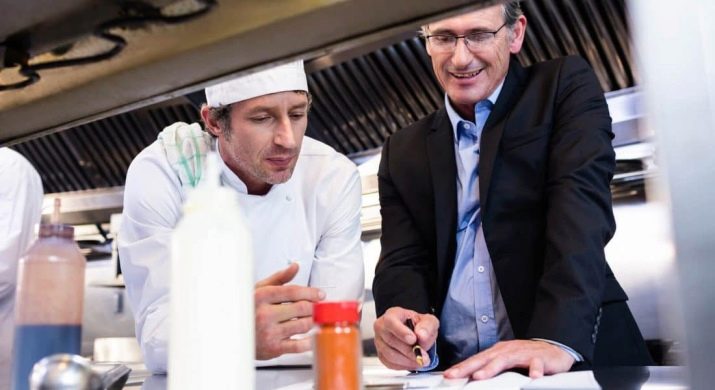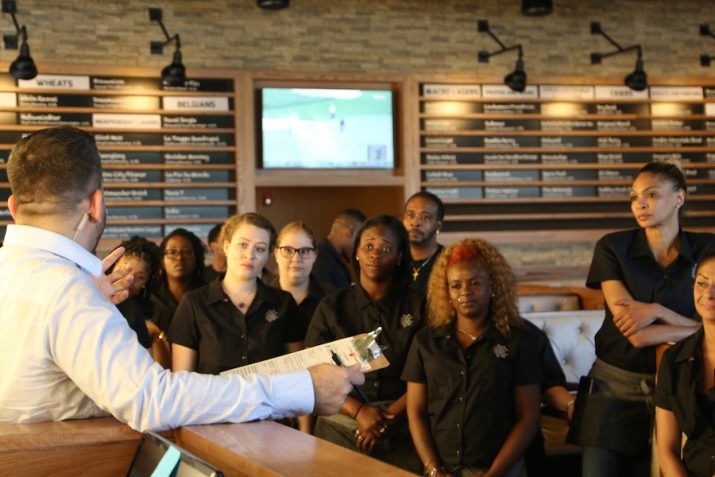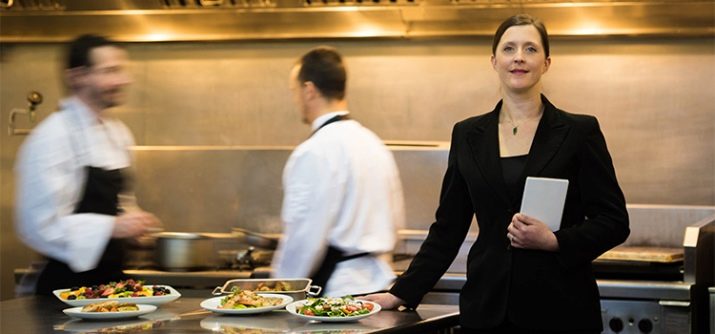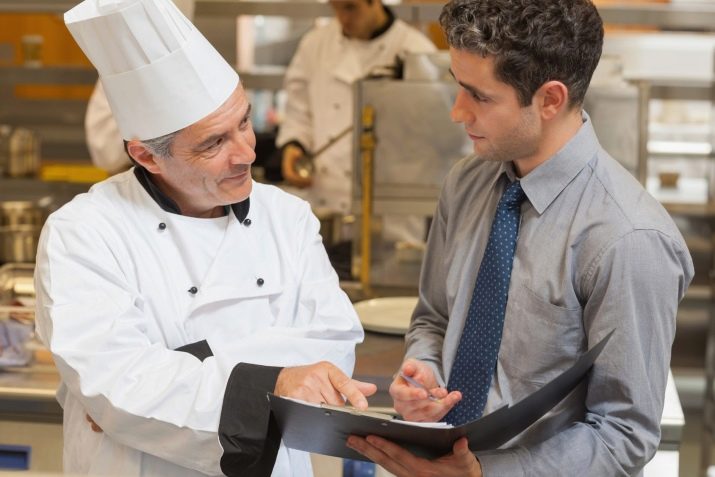Restaurant manager: who is this and how to become?

A restaurant manager is an irreplaceable employee in catering establishments. In fact, this specialist controls and is responsible for all processes occurring in the institution and even forms its image.

Who is that?
The restaurant manager can be called the right hand of the owner or director of the establishment. The activities of a person who is a representative of this profession is practically invisible to visitors, but “behind the scenes” all important actions, from purchasing food to cleaning work, fall under his control. The manager of a restaurant or cafe combines administrative functions with staff management. In addition, it is his responsibility to promptly resolve all emerging issues. I must say that the profession itself arose relatively recently, since earlier these functions were under the control of the owners of catering establishments.
If you compare the job of a restaurant manager with that of a director, the difference is pretty obvious. The first is responsible for solving internal problems, while the second provides more global leadership, taking into account all external factors.
In order to ensure productive work, as well as comply with the requirements of labor laws, the institution must have at least 2 managers. More employees in a given position are also possible.

Responsibilities and functions
The job responsibilities of a hospitality manager are quite extensive. Their summary includes:
- preparation of the institution for the start of work and its closure;
- distribution of responsibilities between staff;
- control of personnel activities.
The manager necessarily conducts training of personnel, monitors the observance of discipline, and also deals with emerging conflicts. If there is no hostess in the restaurant, then the manager or his assistant can meet the guests. If there is a banquet hall, this employee is also responsible for organizing events.

Very important responsibilities of a manager are compliance with sanitary standards, fire safety, as well as interaction with regulatory authorities. The specialist works with grocery suppliers, and sometimes even oversees the maintenance of social networks, resolving guests' questions and monitoring reviews. Finally, the restaurant manager makes a document at the end of each reporting period. All these points can be found either in the job description or in the contract.
If we consider each item in more detail, then you can find many other job duties and functions of the employee. For example, in order to ensure that a restaurant is properly prepared for work, it must arrive an hour before the opening of the restaurant and leave at least an hour later. The employee must be ready at any time to appear in the hall, answer a guest's question, or resolve a conflict that has arisen. He needs to monitor all his employees, if necessary, send them to training, as well as deal with the distribution of responsibilities. If the team does not have a personnel department, then the manager is also engaged in the selection of personnel: he places a vacancy, conducts interviews.
Through this employee, the interaction of different departments takes place. He must keep under control and commodity purchases, and the condition of equipment, and record keeping, and scheduling of personnel. In most cases a restaurant manager is even responsible for such a global task as shaping the restaurant's image.

Every day, a restaurant manager performs at least 12 core tasks.
First of all the establishment is being prepared for the start of work... An hour before the opening, the employee must assess the readiness of the workplaces, control the tardiness of employees and, if necessary, assess the compliance of their appearance with the dress code. During this hour, the manager usually draws up a report for the previous shift, checks the cash register, and also conducts a planning meeting either only with the leaders, or also with the staff of the hall. At the planning meeting, the results are summed up, goals are set and difficult issues are resolved.
In addition, the task of the restaurant manager is to approval of the purchase, check of waybills. On a daily basis, the employee is engaged in tracking social networks, as well as checking the book of complaints and suggestions. If the restaurant has the ability to book tables and hold events, this moment is also controlled by the manager. During the day the manager communicates with visitors, oversees the work of all departments, checks the storage of products and interrogates employees for theoretical knowledge.

Rights and responsibilities
The rights of a restaurant manager are not as extensive as responsibilities. However, he has the ability to request and get acquainted with the information and documents necessary for the successful implementation of his functions. An employee can offer his immediate superiors any ideas for improving the activities of a catering establishment, as well as demand the provision of all the necessary conditions for the performance of official duties.
The restaurant manager also has a number of responsibilities. For example, if he does not fulfill his functions or does it incorrectly, then the manager may well bring him to justice in accordance with labor legislation. If the employee commits especially grave offenses, he will be punished in accordance with the administrative, criminal or civil codes. In the event of material damage to the restaurant, an appropriate penalty will follow.

Requirements
Since a restaurant manager performs a huge variety of functions, the requirements for such a job seeker are quite high.
Qualities
Leadership is of the utmost importance to a restaurant manager. It is he who controls, motivates and organizes the work of subordinates, therefore, for well-coordinated work in relation to the boss, both respect and recognition of his authority must be present. In addition, the unspoken leader of the establishment should always be ready to both come to the rescue and give a stern reprimand. The employee does not need to be hyper-communicative, but he should be a good psychologist. His responsibilities include building the right social climate in the team, as well as preventing and eliminating conflict moments.
Since the restaurant manager must manage to complete numerous tasks every day, time management skills are essential.
The employee must serve as a role model for the staff, which means that his behavior, speech, appearance and discipline must be appropriate.

Skills
The restaurant manager must be good at handling money and managing costs. Because it is he who controls the purchase of products and the write-off, and, if necessary, the repair of equipment, the ability to work with a large material flow is very important... Moreover, it is this employee who is responsible for calculating the revenue. It is important that the manager has organizational skills, because it is under his supervision that practically all the processes occurring are implemented. An employee should be ready to act as a "liaison" between his superiors and subordinates... This implies both communicating the orders of the superiors to the employees and informing the director about the requests of the employees.
In the event that the restaurant does not have an economic department, the manager will have to take over this function. For example, it is he who must track outdated or damaged furniture in time and organize the purchase of new ones. The control skills of the employee, as well as the ability to notice details, are a big plus. The need for brand promotion creates the need to know the best marketing techniques and apply the most effective strategies.
Of course, a restaurant or cafe manager must have relevant experience in the restaurant business. As a rule, those employees who are familiar with the business from the inside become excellent managers - that is, they used to work either as waiters or as administrators. Lack of relevant experience for an employer is a clear reason for refusal. Besides, the manager needs to be aware of all modern legislation.

Training and professional development
Today, a restaurant manager's education is not as important a factor as experience and practical skills. Nevertheless, proper training is still necessary for a correct start. The choice of educational institutions that allow you to become a restaurant manager is quite wide. For example, in Moscow, you can apply to the Institute of Industry Management, the Russian State University for the Humanities or the Moscow State Institute of Tourism Industry named after Yu. A. Senkevich. You should focus both on the “speaking” profile “Management of the hotel and restaurant business” and on such programs as “Restaurant activity”, “Technology and organization of restaurant service” or “Technology of products and organization of public catering”.
Already during work, attending various advanced training courses is encouraged. Alternatively, it can be training for managers of catering establishments or a course in effective management of sales and service in a restaurant.
Since, in addition to his own training, the restaurant manager is also responsible for training the rest of the staff, it will not hurt him to at least partially “pump” himself theoretically in this area, stay abreast of current trends and even develop teaching skills.









